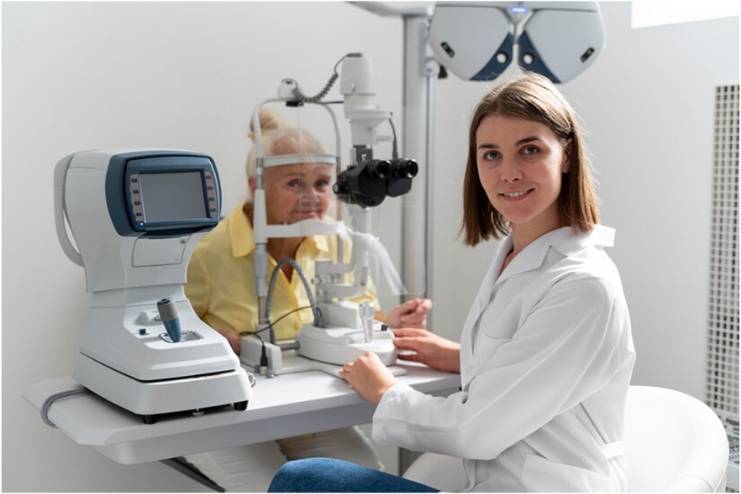AI Contribution
At HealthSpectra, we may use AI to refine grammar and structure, but every piece is shaped, checked, and approved by real people, our expert writers and editors, to ensure clarity, credibility, and care. Learn more..Affiliate Disclaimer
Some links in this article are affiliate links. We may earn a small commission if you make a purchase through these links, at no extra cost to you. We only recommend products we find useful to our readersDiabetes is a condition that affects nearly every part of the body, and your eyes are no exception. You might have heard that a person with diabetes has a higher risk of developing a heart or kidney problem, but did you know that it damages vision as well? The connection between diabetes and eye health is beyond diabetic retinopathy, with often unnoticed changes occurring over time. The first step to preventing serious complications and damage down the road is to understand how diabetes affects your eyes. This article is an attempt to understand and learn about the dangers, advancements in care, and more that could protect your sight for the long.
Dangers of Diabetes for Eye Health
When it comes to diabetes and eye health, most people immediately think of diabetic retinopathy. However, diabetes affects the eyes in ways that extend far beyond this well-known complication. You may also check other types of serious diabetic eye diseases in detail.
- Subtle Vision Changes: Due to diabetes, changes in eyes often take place gradually, and subtle vision changes go unnoticed. In some cases, people lose peripheral vision without noticeable symptoms. This may indicate the early stage of diabetic retinopathy, where high blood sugar levels can damage the tiny blood vessels in the retina.
- The Role of Blood Vessels in Eye Damage: The eyes consist of many tiny blood vessels, and thus they are prone to damage caused by high blood sugar. With time, diabetes causes damage to these vessels, causing either leakage or blood vessels to block. The discomfort of the eye resulting from this blockage is the lack of oxygen and nutrients and, if left untreated, leads to worse conditions.
- Dry Eye Syndrome: Another lesser-known complication of diabetes is dry eye syndrome, wherein the body fails to produce sufficient tears to moisten the eyes. This causes sore eyes and irritation and can lead to blurry vision. Even though many ignore this, chronic dry eye syndrome may predispose to further ocular complications.
- Delayed Healing: Diabetes slows down the body’s healing process, which can be especially problematic to the eyes. Injuries or infections in the eye may take longer to heal, increasing the chances of complications or permanent damage.
The Connection Between Diabetes and Age-Related Eye Issues

Diabetes not only increases the risk of specific diabetic eye diseases but also accelerates age-related eye conditions, impacting vision as you grow older. The combination of aging and diabetes can significantly compromise eye health.
- Presbyopia and Diabetes: As we age, the lens of the eye naturally hardens. This makes objects look blurry when they’re up close, a condition known as presbyopia. For people with diabetes, this normally gradual process can start earlier and progress more rapidly. Moreover, frequent fluctuations in blood sugar can sometimes give you temporary blurring of vision as well, thus complicating the effects of presbyopia. Diabetics often find themselves needing corrective lenses sooner than their non-diabetic peers.
- Macular Degeneration: Age-related macular degeneration affects the central area of the retina and is the main cause of blindness among older individuals. Although AMD is itself an age-related condition, diabetes exacerbates the loss of retinal cells at a faster pace, thereby increasing the risk for the condition as well.
- Cataracts: While cataracts are one of the most common problems of the aging process, people with diabetes have an increased risk of developing this condition at a younger age. High blood sugar concentration causes changes in the lens of the eye, which causes it to become cloudy and subsequently impairs vision. Higher glucose levels also promote the rapid progression of cataracts in diabetic patients.
Managing Aging Eyes with Diabetes
For those managing both diabetes and age-related vision problems, it’s essential to adopt a proactive approach to eye care. This includes regular screenings for diabetic retinopathy and macular degeneration, along with cataract check-ups as early as age 40. Keeping blood sugar levels stable is also crucial in slowing down the onset and progression of age-related eye conditions. You may check out some useful preventive strategies here.
Genetic Factors in Diabetic Eye Disease
While diabetes is often associated with lifestyle and environmental factors, genetics also play a crucial role in determining who is more likely to develop diabetic eye diseases. Understanding how genetic predisposition interacts with diabetes can help identify those at higher risk and offer more personalized care options.
- The Genetic Link to Diabetic Retinopathy: Though some genetic factors are associated with diabetic retinopathy, this is one of the most common eye complications in relation to diabetes. Certain genes associated with inflammation, blood vessel formation, and glucose metabolism might predispose to retinopathy among people with diabetes. If there’s a family history of diabetic retinopathy, then you need to be more vigilant with proper care for your eyes and diabetes.
- Family History: If close family members have been diabetics and suffered from diabetic eye complications, you might be more prone to the same. Diabetic retinopathy and other similar eye disease conditions can be inherited, so even well-managed diabetes cannot reduce the risk completely. Genetic testing may therefore prove as a method to detect patients prone to developing complications from the disease.
- Genes: Genetics not only determines whether you will have diabetic eye diseases but also could influence the severity of the condition. Some diabetes patients may show rapidly progressive retinopathy or macular edema due to a predisposition to genetic factors that expose the blood vessels to damage.
- The Future of Genetics: As research continues to advance, it will open doors to more personalized diabetic eye care in the future. Soon genetic evaluation will predict which individuals are at higher risk for diabetic retinopathy or glaucoma, thus helping prepare an appropriate prevention and treatment strategy.
- Genetics with Lifestyle Management: Though genetic factors play a huge role, they do not act alone. For individuals with a genetic predisposition to diabetic eye diseases, maintaining good control over blood sugar levels, blood pressure, and cholesterol remains essential. With the combination of lifestyle management with awareness of genetic risk, it is the best defense against vision loss.
Conclusion
You need to understand how diabetes affects your eye health to preserve your vision and quality of life. Diabetes is associated with many forms of eye disease. It is essential to proactively manage the condition and visit an eye specialist to conduct required examinations frequently. If you increase your awareness and take preventive measures, you can considerably reduce the risk of developing eye diseases associated with diabetes.
Taking control of eye health is also taking control of diabetes. This involves recognizing genetics and lifestyle in the management of diabetes. Managing blood sugar levels, healthy blood pressure, and cholesterol levels, and a good lifestyle choice can go a long way in safeguarding vision.
As we continue to learn about the complex relationship between diabetes and eye health, more research and technological developments are bringing improvements in the areas of prevention and treatment. Equipped with knowledge and preventive measures, a patient diagnosed with diabetes can look forward to a healthier future for his or her eyes and a better quality of life.
References
- https://my.clevelandclinic.org/health/diseases/common-age-related-eye-problems
- https://www.mayoclinic.org/diseases-conditions/subconjunctival-hemorrhage/symptoms-causes/syc-20353826
- https://www.mayoclinic.org/diseases-conditions/dry-eyes/symptoms-causes/syc-20371863
- https://www.nei.nih.gov/learn-about-eye-health/eye-conditions-and-diseases/presbyopia
- https://www.nei.nih.gov/learn-about-eye-health/eye-conditions-and-diseases/age-related-macular-degeneration
- https://www.mayoclinic.org/diseases-conditions/cataracts/symptoms-causes/syc-20353790
- https://journals.lww.com/ijo/fulltext/2002/50010/genes_and_diabetic_retinopathy.2.aspx
In this Article





















